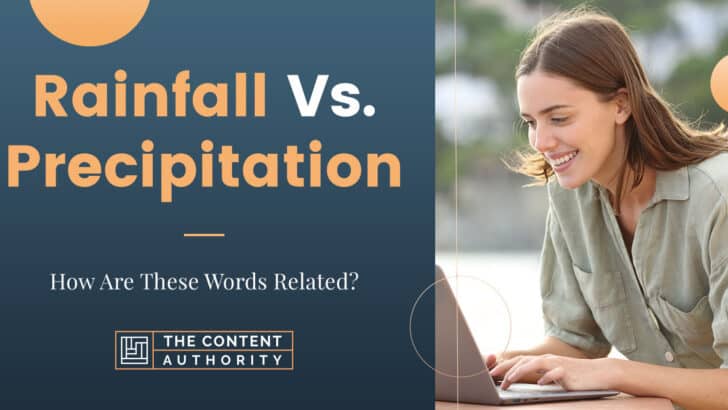People often use the words rainfall and precipitation as alternate words. However, are these words synonyms or correct to use alternatively? A look at the word rainfall vs. precipitation will explain the relationship between these words.
Rainfall refers to the amount of rain that falls on one occasion. It also refers to a fall, descent, or shower of rain. In contrast, precipitation is any form of water, like rain, hail, or snow, that falls on the earth’s surface from the earth’s atmosphere. So, rainfall is a form of precipitation.
Many English words have different yet similar meanings, like rainfall and precipitation. This article will discuss these words and expound on their relationships. Read on for more information.

Definitions Of Rainfall And Precipitation
These words have different spellings. So, knowing their relationship is complicated unless you understand their meanings. For this reason, we will start this section by expounding more on the meanings of rainfall and precipitation below.
Definitions Of Rainfall
Let us start this section by defining the word rain because it will come up in the meaning of rainfall several times. So, what is the meaning of the word rain? Rain is condensed water from the aqueous atmospheric vapor that falls as drops to the earth.
Therefore, rainfall is the amount of rain that descends or falls on a single occasion. It also refers to a fall, rain descent, or a region’s average rainfall (annually).
Another source defines rainfall as “water falling in drops from condensed vapor in the atmosphere.”
A comprehensive definition of rainfall is “the quantity of water expressed in inches precipitated as rain, snow, or hail in a particular area over a specific time interval.
Definitions Of Precipitation
Precipitation is any form of water particle that falls from the atmosphere, like rain, snow, hail, or fleet. A close meaning is “any product of the condensation of atmospheric water vapor falling under gravitational pull from clouds.” Another definition is the quantity of water falling in an area within a specific period.
Some sources define precipitation as “a reaction that leads to forming a heavier solid in a lighter liquid” or “the precipitate formed at the bottom of the container.”
Also, precipitation refers to “hastening or acceleration, especially when sudden or unexpected.” For example, “Faith was responsible for the precipitation of her demise.”
A generic definition of precipitation is “a downward falling, flowing, or rushing with violence or rapidity.” For example, “A rapid precipitation of water towards the sea.” The figurative definition of precipitation is “unwise, rash, rapid, tumultuous hurry, or sudden haste.”
In chemistry, precipitation is the process of precipitating from a solution. To precipitate means “to separate a substance in liquid form from a solution using a reagent.” You can also refer to precipitation as the process of forming a chemical precipitate. In this case, a precipitate is a form of residue.
In daily conversations, the word precipitation means “casting down or falling headlong from a height.”
How to Properly Use Rainfall and Precipitation In A Sentence
The relationship between these words is found in their definitions. But beyond that, you should know how to use each word in sentences. This section will cover some tips for using the terms rainfall and precipitation in sentences.
How To Use The Word Rainfall
Use this noun to refer to:
- Condensed atmospheric moisture falling in visible and separate drops
- A shower of rain
- A descent of precipitation
Rainfall is an uncountable noun because it is impossible to quantify the number of raindrops. For example, you cannot say, “twelve rainfalls.” For this reason, this word does not have a plural form. However, a few sources claim that you can use a plural form when referring to a type or collection of “rainfalls.” Regardless, it would help if you were keen on using the plural form, especially in general contexts.
How To Use The Word Precipitation
This word is also a noun. So, you can use it in a sentence to mean:
- Water droplets or particles descending from the atmosphere or sky
- Sudden haste or rush
- A severe snowstorm accompanied by high winds
- The conversation of vapor or gas to liquid (chemistry)
- A moderate level of degree of wetness
- A buildup of matter
- The condition of increasing speed
- The act of dropping downwards or descending
- A small waterfall that falls in stages down a steep rocky slope
- A frozen state of water that drops from the atmosphere as precipitation
Precipitation is generally an uncountable noun, especially when referring to rain. Interestingly, the term “precipitations” is correct in some contexts. In a sentence, “Meteorologists have already warned of monsoon precipitations.”
Rainfall And Precipitation: Three Ways These Words Are Related
This article discusses these words because of their relationship. However, since they do not have similar spellings or pronunciations, the relationship between these words is unclear to many. Here are some ways through which these words are connected:
The Definition
The core relationship between these words is in their definition. Rainfall is an amount of rain falling from the atmosphere on a particular occasion. In contrast, precipitation is any form of water falling from the atmosphere. Therefore, rainfall is a form of precipitation. It is worth noting that the word precipitation has several unrelated meanings. Therefore, some meanings have no relationship with the definition of rainfall.

Application Context
You can also use these words in the same application contexts. This is thanks to their related definitions. Another way these words are related is that they belong to the same part of speech. Both words are nouns.
Rainfall Vs. Precipitation: Spelling, Pronunciation, and History of These Words
The proper spellings for these words are “P.R.E.C.I.P.I.T.A.T.I.O.N.” and “R.A.I.N.F.A.L.L.” Note that the second word is a compound noun. Therefore, you should not separate its word-forming elements “rain + fall” when writing it. Correct spelling is paramount in writing for proper communication.
Pronunciations
The proper pronunciation of “precipitation” is “/pri-sip-i-tey-shun/.” On the other hand, the correct way to say “rainfall” is “/reyn-faw/.
The History Of Rainfall And Precipitation
The word rainfall came about in the 1850s from combining rain and fall. On the other hand, the word precipitation came about in the late 15th century. Precipitation comes from the Old French word “precipitation” from the Latin term “praecipitationem,” meaning “the act of falling headlong.” The meaning “sudden or tumultuous haste” came up in 1610.
List Of Examples Of Rainfall And Precipitation Use In Sentences
This article would be incomplete without some sentences featuring these words. Here are ten sentence examples:
Example sentences of the word rainfall
- Too much rainfall will cause significant damage to the farm.
- George got home before the rainfall began.
- A rain gauge measures the quantity of rainfall in a given area.
- The roof could not withstand the heavy rainfall.
- The rainfall in the Eastern region led to massive structural destruction.
Example sentences of the word precipitation
- The scientists confirmed the presence of protein in urine through a precipitation test.
- Rain and snow are both examples of precipitation.
- The farmers had a great harvest season despite the high temperatures and low precipitation.
- The lack of precipitation in Texas has contributed to the food crisis.
- The precipitation in the test tube shows proteinuria in the sample.
Conclusion
Precipitation is a general term referring to various forms of atmospheric moisture falling on the earth’s surface. In contrast, rainfall is a shower of rain or a specific rain amount falling on the earth’s surface in a specific area over time. These definitions clarify the relationship between these words. So, while these words are related, their definitions have some differences.
Shawn Manaher is the founder and CEO of The Content Authority. He’s one part content manager, one part writing ninja organizer, and two parts leader of top content creators. You don’t even want to know what he calls pancakes.

